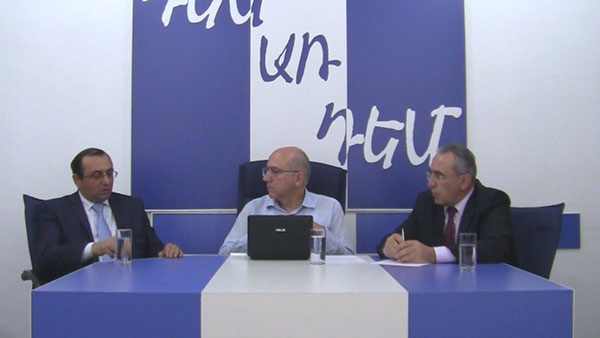The topic of Aravot online “Face to Face” talk show is discussed between the MPs Hakob Hakobyan (RPA) and Artsvik Minasyan (ARF).
Aram Abrahamyan – The Republican Party finds that the problem at this phase is resolved to the extent of possibility, whereas the rest are unhappy. What is resolved? And what is the reason of being unhappy by other factions?
Hakob Hakobyan – We see the culmination in the matter that after the Constitutional Court’s decision as of April 2, we were able to regulate the relationship by the enforcement of the law, so that there will be no question by the public at least now in terms of actions. This will just gain time until the main provisions of the law are amended in compliance to the Constitutional Court’s decision, and are brought to the National Assembly.
Artsvik Minasyan – Let me first say that the matter is not in gaining time. This was a project aimed at mitigation of the tension created in other conditions, about which 4 political forces had presented more radical approach. Two important issues were more perceptible or solvable for the majority of the government… First, to consider the citizen’s expression of will during the execution of this component until provision of complete legislative solutions, secondly, to extend the enforcement of the law over the relations since January 1, with this logic. Naturally, 2 important issues for the public were left open. First is the issue of returning the resources available in the funds, and second, future-oriented, uncertainty in the future. We also expect such an explanation and appropriate actions by the authorities. For instances, many of us is concerned that if an employee writes an application of refusing the mandatory, the employer may not accept, or be imposed to administrative pressure and reject accepting the application. Here, it is very important that the authorities, particularly, the government, clearly express this position. It comes to especially the educational sector, where the previous government’s position is very clear. The Minister of Education and Sciences has issued a directive requiring the mandatory. Now, the policy change already suggests that the government should express a clear position. It might be in the form of an instruction, or a referral, or “threatening” that no public or a department with public involvement has the right to transgress the expression of will by any employee, and to impose the employee not to write an application on refusing the mandatory pension.
A. A. – Why don’t you “threaten”?
H. H. – When I ask myself what we benefit after all this fight and after this long-term work on the law on funded pensions, then the answer to the question is absolutely definite to me. Our civil society has never been on such a high level, and I hope that everyone will understand, very simple, humanly and in Armenian language.
A. A. – And what would you say about the money to be refunded?
H. H. – The money that has already been accounted for and transferred to the “bridge account,” the money problem will be resolved in September when we will introduce the basic law to the National Assembly. I repeat once again, the money that are already accounted for but not transferred, are returned applicant based on his the application, and the amounts are not calculated, nor transferred, based on the application they are counted as legal as of January 1.
Prepared by ARAM ABRAHAMYAN
“Face to Face” talk show series are released by the Open Society Foundations-Armenia. The views and analyzes found in this broadcast express the opinions of the participants, and are not approved by the Open Society Foundations-Armenia, or its Board. This broadcast is made available thanks to comprehensive financial support by the Open Society Foundations-Armenia, under the mass media support program, grant No 18624.



















































